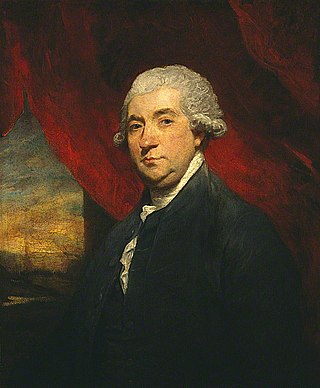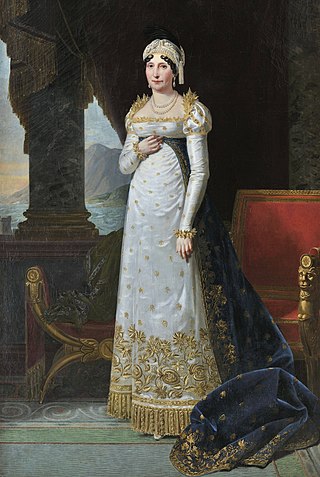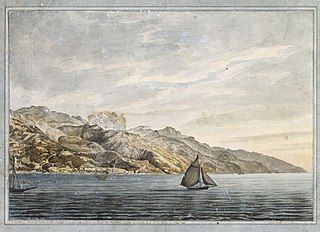
James Boswell, 9th Laird of Auchinleck, was a Scottish biographer, diarist, and lawyer, born in Edinburgh. He is best known for his biography of his friend and older contemporary, the English writer Samuel Johnson, which is commonly said to be the greatest biography written in the English language. A great mass of Boswell's diaries, letters, and private papers were recovered from the 1920s to the 1950s, and their ongoing publication by Yale University has transformed his reputation.

Filippo Antonio Pasquale de' Paoli was a Corsican patriot, statesman, and military leader who was at the forefront of resistance movements against the Genoese and later French rule over the island. He became the President of the Executive Council of the General Diet of the People of Corsica and wrote the Constitution of the state.

Carlo Maria Buonaparte or Charles-Marie Bonaparte was a Corsican lawyer and diplomat, best known as the father of Napoleon Bonaparte and grandfather of Napoleon III.

Maria-Letizia Bonaparte, known as Letizia Bonaparte, was a Corsican noblewoman and mother of Napoleon I of France. She became known as “Madame Mère” after the proclamation of the Empire. She spent her later years in Rome where she died in February 1836.

The history of Corsica goes back to antiquity, and was known to Herodotus, who described Phoenician habitation in the 6th century BCE. Etruscans and Carthaginians expelled the Phoenicians, and remained until the Romans arrived during the Punic Wars in 237 BCE. Vandals occupied it in 430 CE, followed by the Byzantine Empire a century later.

Italian irredentism in Corsica was a cultural and historical movement promoted by Italians and by people from Corsica who identified themselves as part of Italy rather than France, and promoted the Italian annexation of the island.

The Corsican Brothers is a 1941 swashbuckler film starring Douglas Fairbanks Jr. in a dual role as the titular conjoined twins who are separated at birth and raised in entirely different circumstances. Both thirst for revenge against the man who killed their parents, both fall in love with the same woman. The story is very loosely based on the 1844 novella Les frères Corses by French writer Alexandre Dumas, père.

In July 1755, Pasquale Paoli proclaimed Corsica a sovereign state, the Corsican Republic, independent from the Republic of Genoa. He created the Corsican Constitution, which was the first constitution written in the Italian language. The text included various Enlightenment principles, including female suffrage, later revoked by the Kingdom of France when the island was taken over in 1769. The republic created an administration and justice system, and founded an army.

The Anglo-Corsican Kingdom, also known officially as the Kingdom of Corsica, was a client state of the Kingdom of Great Britain that existed on the island of Corsica between 1794 and 1796, during the French Revolutionary Wars.

The Tower of Nonza is a Genoese tower located in the commune of Nonza (Haute-Corse) on the coast of Corsica. The tower sits at an elevation of 155 metres (509 ft) in the village of Nonza on the west coast of Capicorsu.
The Corsican Crisis was an event in British politics during 1768–69. It was precipitated by the invasion of the island of Corsica by France. The British government under the Duke of Grafton failed to intervene, for which it was widely criticised and was one of many factors that contributed to its downfall in early 1770.

The siege of Bastia was a combined British and Corsican military operation during the early stages of the French Revolutionary Wars. The Corsican people had risen up against the French garrison of the island in 1793, and sought support from the British Royal Navy's Mediterranean Fleet under Lord Hood. After initial delays in the autumn, Hood had supplied a small expeditionary force which had successfully driven the French out of the port of San Fiorenzo in February 1794. Hood then turned his attention to the nearby town of Bastia, which was held by a large French garrison.

The siege of San Fiorenzo was a British military operation, supported by Corsican partisans early in the French Revolutionary Wars against the French-held town of San Fiorenzo on the Mediterranean island of Corsica. The Corsican people had risen up against the French Republican garrison in 1793 after an attempt to arrest the Corsican leader Pasquale Paoli during the Reign of Terror. The French had then been driven into three fortified towns on the northern coast; San Fiorenzo, Calvi, and Bastia and Paoli appealed to the British Royal Navy's Mediterranean Fleet, commanded by Lord Hood, for assistance against the French garrison.

The French conquest of Corsica was a successful expedition by French forces of the Kingdom of France under Comte de Vaux, against Corsican forces under Pasquale Paoli of the Corsican Republic. The expedition was launched in May 1768, in the aftermath of the Seven Years' War. A French expeditionary force was landed on the island of Corsica, then ruled by the Corsican Republic. Marching inland to overcome any Corsican opposition, the French force initially suffered an unexpected defeat at the Battle of Borgo. But a new commander, the Comte de Vaux, was appointed to lead the expedition, and decisively defeated the Corsican army at the Battle of Ponte Novu in 1769, effectively bringing an end to Corsican resistance.
The Dick baronetcy in Prestonfield, Edinburgh was created in the Baronetage of Nova Scotia for James Dick. Initially created in 1677, it was renewed in 1707 and merged with the Cunningham of Lambrughton, Ayrshire baronetcy in 1829. The family seat was Prestonfield House, Edinburgh. Sir William Dick, 2nd Baronet and Sir Alexander Dick, 3rd Baronet were the younger sons of Sir William Cunningham, 2nd Baronet and his wife Janet Dick, the daughter and heiress of Sir James Dick, 1st Baronet. Both brothers changed their surname to Dick on inheriting Prestonfield in turn.
William Johnson Temple (1739–1796) was an English cleric and essayist, now remembered as a correspondent of James Boswell.

The invasion of Corsica was a campaign fought in the spring and summer of 1794 by combined British military and Corsican irregular forces against a French garrison, early in the French Revolutionary Wars. The campaign centred on sieges of three principal towns in Northern Corsica; San Fiorenzo, Bastia and Calvi, which were in turn surrounded, besieged and bombarded until by August 1794 French forces had been driven from the island entirely.

Constitutional Project for Corsica is the second of Jean-Jacques Rousseau's three works on political affairs, following The Social Contract and preceding Considerations on the Government of Poland.
Lieutenant-General the Most Noble Francesco, Count Rivarola was a Corsican who became a senior British Army officer, and served in the Napoleonic Wars throughout the Mediterranean Region. He was involved in the development of Maltese military and police forces; he also convinced the British of the value of using anti-French Mediterranean levies. He was born in 1779 on Corsica and died whilst on duty as Lieutenant Governor of Zante in 1853, on the Island of Cephalonia.

















